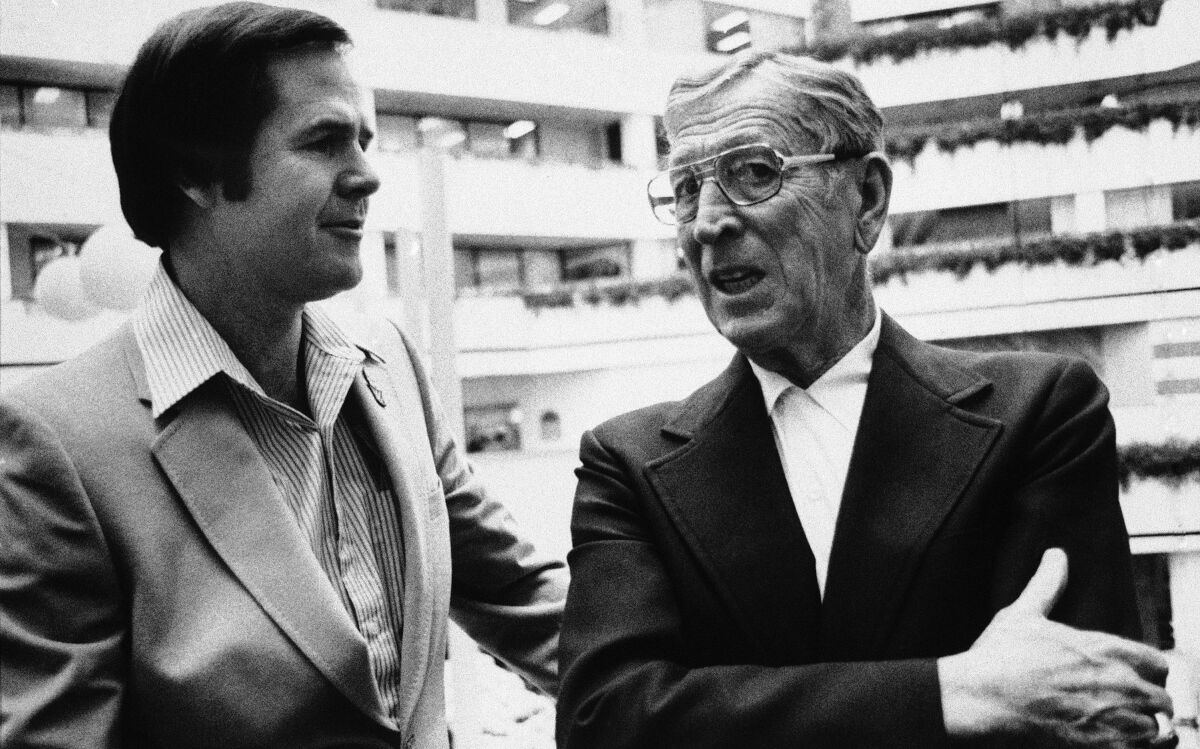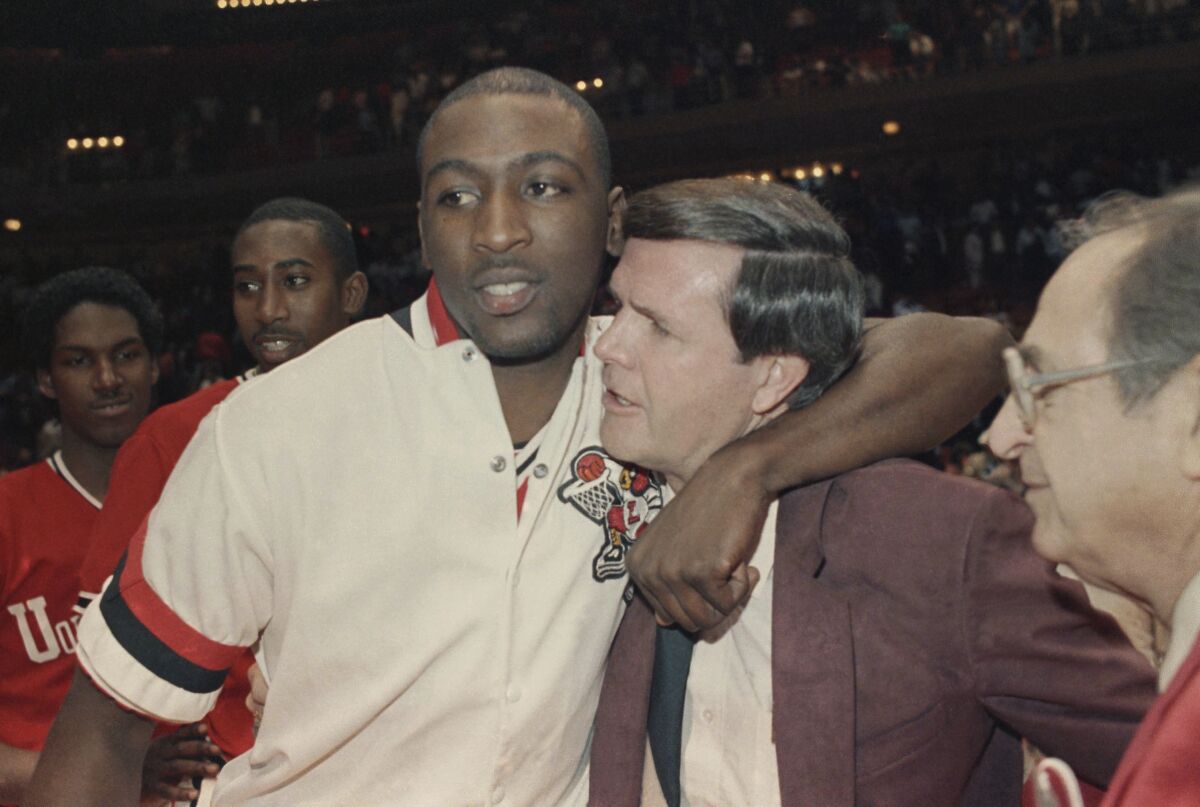Appreciation: Denny Crum’s Louisville dynasty left UCLA fans wondering what might have been
Only minutes after losing to John Wooden’s UCLA Bruins in the 1975 Final Four, Denny Crum heard the same rumors as everybody else.
He was the likely successor to the coaching legend who had just announced that he would retire after facing Kentucky in the championship game two days later.
Even then, relatively early in his coaching career, Crum was a star. He had taken Louisville to two Final Fours by age 38. He was a relentless recruiter and unfailingly charismatic. He knew the Wooden Way as well as anyone, the San Fernando native having played for the coach and apprenticed under him for three more seasons.
To the surprise of many, Crum stayed at Louisville and the Bruins hired Gene Bartow. It was the first of several flirtations between Crum and UCLA that left many Bruins wondering what might have been given the long line of failed Wooden successors.
“Well, he would have won,” Gary Cunningham, a longtime friend of Crum’s who coached alongside him under Wooden, said by telephone Tuesday after Crum died at 86. “He would have done a good job.”
For Louisville fans, there were no what-ifs, only what was: a basketball dynasty. Crum stayed for 30 years, guiding the Cardinals to two national championships (including a triumph over Larry Brown’s Bruins in the 1980 title game), six Final Fours and a 675-295 record before retiring in 2001.
His teams won with many of the principles he had learned under Wooden. Louisville used the same defensive practice drills and ran a version of the same high-post offense. Crum even mimicked Wooden in his sideline demeanor, clutching a rolled-up program in one hand.
In 1994, Crum became just the third active college coach to be inducted into the Naismith Memorial Basketball Hall of Fame, following Dean Smith and Bob Knight. Wooden traveled from Los Angeles to Springfield, Mass., to accompany Crum to the stage during the ceremony.
By then, UCLA was nearly two decades removed from its last national title under Wooden and a year away from its next championship, under Jim Harrick. To many, it felt like an eternity of darkness that could have been avoided had the Bruins not repeatedly dropped the ball with Crum.
What else did the guy have to prove when it came to his Bruin bonafides? After starting his career at Pierce College, Crum spent two eager but unremarkable years as a UCLA guard, averaging 8.7 points in his final season while winning a most-improved-player award. He also hosted Cunningham on the high school prospect’s official visit, taking him to Lawry’s in Beverly Hills inside a Volkswagen that could barely accommodate the 6-foot-6 forward.
After graduating in 1959, Crum coached at Pierce while making an evening commute to Westwood to help UCLA assistant Jerry Norman coach the Bruins freshmen for free.
Crum’s first break came in 1968. Fed up with UCLA’s notoriously cheap ways, Norman left to become a stockbroker and Crum moved onto Wooden’s staff alongside Cunningham. Crum told former Times writer Mark Heisler in “They Shoot Coaches, Don’t They?” that the move entailed a $3,000 pay cut. It proved worthwhile given that the Bruins won a national title in each of the three seasons Crum coached under Wooden.

Former UCLA basketball coach John Wooden and Louisville basketball coach Denny Crum discuss the upcoming NCAA basketball championships in Indianapolis on March 21, 1980. Crum was a former assistant of Wooden at UCLA.
(Associated Press)
Eager to show that he could make it as a head coach while putting himself in the running to become Wooden’s successor, whenever that chance might arise, Crum took the Louisville job in 1971. He told Heisler that he believed UCLA athletic director J.D. Morgan would not hire an assistant coach to replace Wooden.
Immediately proving his worth, Crum took his new school to the Final Four in his first season. Too bad the Cardinals had the misfortune of running into Wooden’s Bruins in a national semifinal. Final score: UCLA 96, Louisville 77.
Three years later, the teams met again on the same stage. The Bruins were on the verge of needing a new coach after Richard Washington’s jumper in overtime had vaulted his team into the final game of the Wooden era following his surprise retirement announcement.
Morgan very well might have gone with an assistant as Wooden’s replacement had Cunningham not removed himself from consideration, taking a job with the UCLA Alumni Assn. Crum called a news conference to say he was staying at Louisville because he had not accomplished what he wanted to at the school even with the two Final Four appearances. Skeptics pointed to another reason for that press conference — the UCLA job was going to Bartow and Crum knew it.
Morgan, who died in 1980, never told anyone why he didn’t go with Crum when he first had the chance. An offer would come two years later, after a disgruntled Bartow essentially ran himself out of town following the 1976-77 season.
Crum accepted the job before backing out, saying the pay was too low and the cost of living in L.A. too high. One person close to the situation told Heisler that Morgan had given Crum a lowball offer of $33,000 — matching Wooden’s final salary — knowing that he wouldn’t accept so the athletic director could tell alumni pining for Crum that he had tried.
Crum, who lived on a 55-acre ranch outside Louisville, considered the cost of a comparable plot should he take the UCLA job.
“Where could I afford 55 acres in Southern California?” he once said in explaining his decision to turn down the Bruins. “Probably not even in the Mojave Desert.”

Louisville’s Robbie Vallentin hugs coach Denny Crum after beating Auburn 84-76 for the West NCAA championship in Houston on March 21, 1986.
(Associated Press)
By the time UCLA athletic director Peter Dalis finally circled back to Crum with a legitimate offer, after Walt Hazzard’s dismissal in 1988, Crum had lost interest. The homecoming would never happen.
Cunningham, who took the job that Crum wouldn’t touch as Bartow’s successor in 1977, said he didn’t know the mechanics of any offers that were or weren’t made to Crum.
“I just know Bob Fischer, who was J.D.’s right-hand man and later A.D., came over and talked to me and asked me if I would be interested,” Cunningham said, “but that’s all I know.”
Cunningham, who had also played and coached under Wooden, didn’t need any familiarizing with the frugal ways of UCLA’s athletic department. He had made $20,000 as an assistant coach, getting a bump to $30,000 as head coach and a $3,000 raise after his first season ended in a Pac-8 Conference title as well as a Sweet 16 loss in the NCAA tournament. Cunningham pocketed just $6,000 a year for his coach’s TV show and had to hold summer camps off campus because UCLA would not make Pauley Pavilion available.
The gulf between the lifestyle Crum enjoyed at Louisville and what he would have experienced at UCLA was obvious. Cunningham saw it himself when he dined with Crum in Louisville, watching his longtime friend ask for the check only to be told another patron — undoubtedly a huge Cardinals fan — had picked up the tab.
“I don’t believe UCLA would match what Louisville was paying him and the benefits he had and bonuses for winning and so forth,” said Cunningham, who lasted only two seasons as UCLA’s coach before resigning to begin a career in athletic administration. “In those days, coaches at Long Beach State and places like that were making more than the UCLA head coaches, but the expectation was always to win — big-time — at UCLA.”
For better or worse, it was a burden Crum never had to bear.
For all the latest Sports News Click Here
For the latest news and updates, follow us on Google News.
